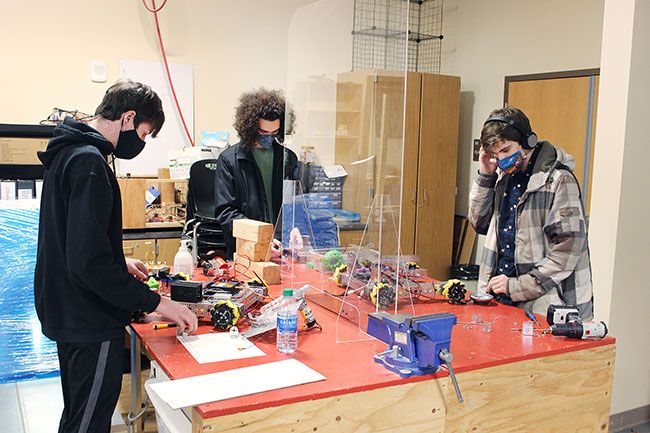Challenges, career programs encourage students to continue

Educators don’t want that to happen again.
“It’s really a challenge to keep interest high” without seeing students face-to-face in the building, said Veronica Chase, an assistant principal at MHS.
McMinnville’s elementary children are expected to start hybrid classes in March, but district officials have yet to decide when, or if, Grizzlies will return to the building this spring.
Whatever happens, teachers and administrators are counting on career courses, challenging classes and opportunities to earn college credits, as well as plenty of personal attention, to steer high schoolers on the right path.
The school is also utilizing some “Limited In-Person Instruction,” or LIPI, including certain elective, career, special ed and language classes.
Fabrication teacher Chip Ford sees members of Mac High’s welding club when they enter the Career-Technical Education building a few at a time to work on projects. Using the school’s professional-grade equipment is important, said Ford, who also teaches distance-learning classes.
Students can learn safety procedures and welding techniques by reading and discussing, but there’s nothing like actually using the machines, he said. In person, “it’s loud and hot; it’s a different feeling,” that just can’t be replicated online.
Students also thrive on seeing one another, said EASA teacher David Clauson, who advises robotics teams as they design and build robots and enter competitions. They meet after school via Zoom on Mondays and in person two other days a week.
The in-person sessions allow students to better practice communication and collaboration. That aspect of learning is so important, Clauson said, that he worries about students who don’t have in-person contact. What are the longterm effects of isolation from your peers? he asked.
Science teacher Laura Syring also noted the positive effect socializing can have in the learning process. Even simple things like moving between classes in different parts of the buildings, she said.
[See also: For McMinnville science teacher, extra training worthwhile]
Syring, who teaches Advanced Placement classes, would prefer to see her students in Mac High’s science rooms, which opened in September 2019, six months before the pandemic closure. From home, students still can analyze data and draw conclusions, but they don’t have the experience of turning on a Bunsen burner themselves.
“They’re missing out on the fun part,” she said. Distance learning works, “but it’s harder to keep their attention.”
Mac High wants all students to build forward momentum and continue it after graduating, Principal Amy Fast said, whether that means starting a profession that will lead to a family-wage career, enrolling in trade school or the military, or going to college.
“We help them take the next step, and make sure they do, if we can,” Fast said.
The support begins the day they enter as freshman. By senior year, staff members have multiple conversations with each student, both in person and through two senior surveys.
They ask not only about their plans and dreams, but also how the school can keep in touch after graduation to ensure they are doing well or help them if they need support.
Fast said some members of the Class of 2020 decided to skip or delay college because they were tired of online learning after using that format the final two months of their senior year.
Some cited costs: If they were going to pay high prices for college, they wanted the value of in-person classes. Some colleges and universities didn’t plan to reopen their campuses in 2020-21, although others, such as Linfield University, did.
Finances caused other students to delay or decide against continuing, even though they wanted to. With job losses and other economic problems, many families simply didn’t have the means to pay tuition, Fast said.
In response, Mac High’s college and career advisory team has worked hard to show cash-strapped families there are options, Fast said.
Students could start at a community college or seek out scholarships, loans and grants. Those with good grades could qualify for the Chemeketa Scholars program, which carries two years of free tuition.
Looking at financial options, as well as planning academically, is a goal of the school’s AVID program (Advancement Via Individual Determination). Fast said students who aren’t in AVID also get an overview of college planning with the option of attending additional workshops on the topic.
A new online program, “Going Merry,” also helps students find financial support. Searching out and applying for scholarships can be “overwhelming,” Fast said. Going Merry makes it not only easier, but more likely that students will find niche scholarships for which they qualify.
Many Mac High students get a headstart on college by taking classes that carry college credit, in addition to counting toward their diploma.
Mac High’s Advanced Placement classes include rigorous courses in math, science, social studies and other subjects.
Enrollment in AP classes is down slightly during comprehensive distance learning, but still strong, the principal said, adding that the College Credit Now dual credit program remains vital, as well.
The dual credit program has the added benefit of schooling at a discount: Students pay $25 to take part, saving hundreds of dollars on the cost of college credits.
Mac High leads the state in the number of dual credits earned each year; its Class of 2020 earned more than 6,000. That level of success is due, in part, to the number of Mac High teachers who embrace the program, Fast said.
Teachers need additional training to qualify to teach either dual-credit or AP courses. They’re willing, though, because it helps students, she said.
“Being a high school teacher includes wanting to provide the enrichment and extra opportunities,” Fast said, adding, “everyone at Mac High buys into that mission.”
Mac High students are required to earn three pathway credits in order to graduate. The rule helps keep them engaged, too, no matter where the learning is being done.
In pathways such as computer science, criminal justice and early childhood development, students explore career interests or determine what doesn’t interest them, Chase and Fast said.
Many of the classes include real world experiences still available during the pandemic, such as positions with Solid Form fabrication company or Willamette Valley Medical Center.
In some cases, the experiences can lead to employment after graduation.
No matter what, Chase said, they are positive for both students and employers, who are looking for dependable job candidates.
“We’re working hard to increase business partnerships,” she said. “We want to make it mutually beneficial; make the pathway classes contribute to the community now, not just help students.”








Comments